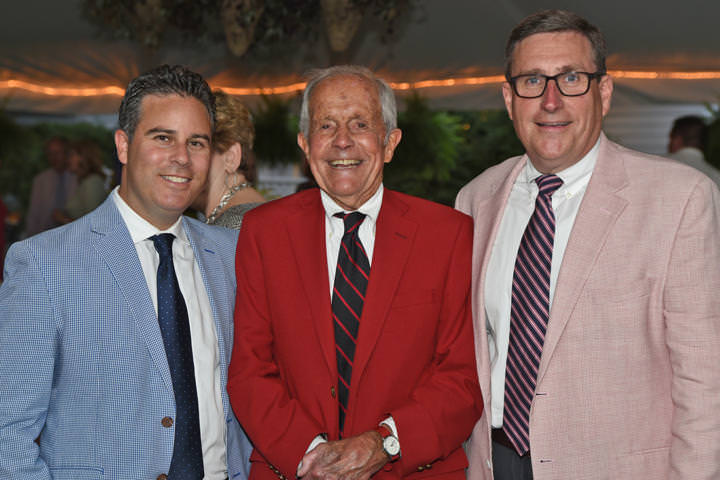
Racing partnerships: Spreading the risk and reward
By Nicole Russo
If Cot Campbell had not been so stubborn in his belief that partnerships were the way to attract new owners to Thoroughbred racing, the winner’s circle at Belmont Park after Justify had won the Triple Crown might have been much less crowded.
“Originally, my concept of forming a partnership to own racehorses did not meet with wild enthusiasm within our industry,” Campbell recalled. “Early on, some very astute racing people advised me to abandon the partnership idea, but my blood was up. I pushed on. And you see before you today the poster boy for the slogan ‘Energy and enthusiasm can overcome stupidity and bad judgment.’ ”
The audience at the induction ceremony for the National Museum of Racing and Hall of Fame earlier this month laughed appreciatively as the 90-year-old Campbell, whose Dogwood Stable is widely considered to have flung open the floodgates for the modern racing partnership, joined racing’s pantheon as a Pillar of the Turf.
His contributions were, fittingly, recognized in a year when partnerships have taken center stage. If Campbell is the poster child for energy and enthusiasm, then Triple Crown winner Justify is the current poster child for racing partnerships, encompassing several models that have evolved over the years. The colt raced for WinStar Farm and China Horse Club, which together bought him as a yearling in a case of high-profile groups teaming up rather than competing against one another at auction; Starlight Racing, a traditional partnership syndicate; and Sol Kumin, who plays at a high level by sharing in proven commodities.
Justify is no aberration. Consider the prior winner of the Kentucky Derby, Always Dreaming, whose ownership line in the program included MeB Racing Stables, Brooklyn Boyz Stables, Teresa Viola Racing Stables, St. Elias Stables, Siena Farm, and West Point Thoroughbreds.
“Over 1,200 people have come into racing through Dogwood, and I believe half the people racing horses in America are racing in some sort of partnership,” Campbell said.
Run of classic success
Ownership syndicates have taken center stage in America’s most famous races in recent years. Animal Kingdom carried the colors of Team Valor International to victory in the 2011 Kentucky Derby. Just two years later, Palace Malice won the Belmont Stakes, becoming Dogwood’s second classic winner, following Summer Squall in the 1990 Preakness Stakes.
Campbell syndicated horses for several years before officially launching Dogwood Farm in 1973. By pioneering the now-popular plan of group ownership, he opened the door for more people to participate in Thoroughbred racing at a reasonable cost. He is widely considered the originator of the modern racing partnership model, and several other groups began popping up in the years following.
Dogwood and Team Valor, along with racing syndicates such as Donegal Racing, Eclipse Thoroughbred Partners, Starlight Racing, StarLadies, Valor Ladies, West Point Thoroughbreds, and similar groups, operate under the same premise, with their own individual nuances. General partners in the operations put up money to purchase horses, typically yearlings or 2-year-olds, and shares in the horses are then offered to investors.
Buying into a horse in partnership offers less risk, especially for nascent owners, than an outright solo purchase – although low-stake ownership is by no means a guaranteed profit enterprise.
“Because financial gain is not the primary reason participants become involved in Team Valor racing ventures, the question really should be, ‘Have your clients received value for their racing investment?’ ” an information page for prospective owners on Team Valor’s website states. “The answer to that question is, ‘Most certainly.’ If the goal of Team Valor and its participants was to make money and the stable was operated as a business, horses would be sold on a timely basis. However, investors in Team Valor racing ventures participate because they want to consume or use the product, not buy it for resale. If ‘value’ represents quality involvement by participants at the highest level of racing, then Team Valor investors have received it.”
Five years ago, Dogwood and Eclipse, which had begun to develop a working relationship and share facilities, merged operations as Campbell began to scale back his work. New horse purchases were made and managed by Aron Wellman’s Eclipse, with Jack Sadler, who had served as Dogwood’s vice president for 37 years, becoming vice president of operations for Eclipse. Additionally, the group’s financial operations were streamlined under a single chief financial officer, former Dogwood treasurer Bill Victor.
“Cot Campbell, his brand, staff, and family are pure class and to be provided the opportunity to live up to the high standard he has set is a responsibility I do not take lightly,” Wellman said at the time. “We have come to know many of the Dogwood faithful, and we’re keen to welcome them into the Eclipse family. It is an honor to be handpicked by Cot to carry on his esteemed legacy. This is the ultimate endorsement.”
Eclipse also has tasted classic success recently, with Tapwrit carrying its silks home in the 2017 Belmont Stakes. The partnership had teamed up with Bridlewood Farm and Robert LaPenta in order to acquire the colt for $1.2 million at the Fasig-Tipton Saratoga selected yearling sale – and also to spread the risk.
